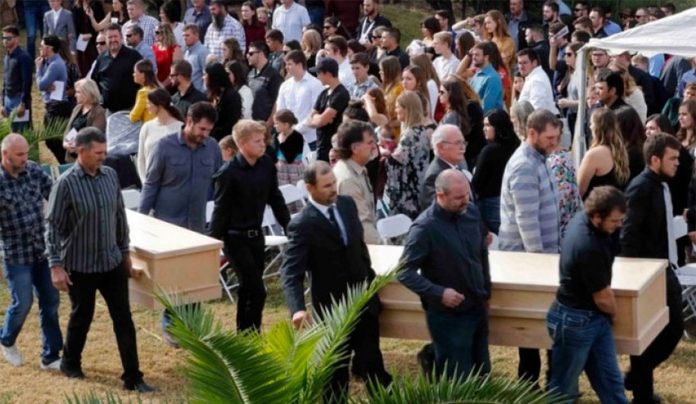Dozens of people have lost their jobs in Bavispe, Sonora, due to the exodus of Mormon families following the massacre of three women and six children this month, and more workers are worried that they will suffer the same fate.
Many women previously employed as domestic workers and nannies in the small community of La Mora and men who worked as gardeners no longer have jobs, the newspaper Milenio reported.
About 100 people from La Mora, where most of the victims of the November 4 attack lived, and Colonia LeBarón in Chihuahua left Mexico last Saturday for the United States.
Workers who travel to La Mora from Bavispe as well as the municipalities of Bacerac and Huachinera to work on pecan farms owned by Mormon families fear that they too could find themselves out of a job.
“The Langfords and the Millers give us work here, we’ve been with them for 22 years. If they go, we’ll be left without food because that’s how we make a living,” said Héctor Durazo Martínez, a farmworker who earns about 2,000 pesos (US $100) a week.
“If we’re left without work, we’ll have to start over and where will we look? As things are at the moment, I think that we would struggle to find work,” he added.
The week after the massacre that also left five children wounded, La Mora looks like a ghost town, Milenio said. Just seven of 25 homes are occupied and the streets are deserted.
Lafe Langford and his family, relatives of the nine murder victims, are the latest people to pull up stakes. They left for Louisiana on Wednesday.
“I feel like I’ve got 10 tonnes of stones on my back and I need to go and see something different, I don’t want to see that road [where the massacre occurred],” Langford told Milenio.
“I went to Bavispe . . . to buy some cattle tags and I told the ladies there that I was going to leave, they hugged me and started to cry.”
Julian LeBarón, another relative of the murder victims, claimed that the exodus of Mormon families to the United States won’t be permanent.
In a radio interview, he said that many people who left their communities in northern Mexico did so to be close to the five wounded children who are in hospital in Tucson, Arizona.
LeBarón said he was confident that families planning to stay in the U.S. for the time being would eventually return to Mexico.
“In 2009 [when two members of the Mormon community were murdered] a lot of people left but they came back. This is our home, it’s what we’ve built over a century. We obviously don’t want to abandon it,” he said.
Colonia LeBarón, located southeast of La Mora, has had Federal Police protection since 2010 and the municipality in which the town is located, Galeana, is one of the safest in Chihuahua, LeBarón said.
Although the government announced on Monday that suspects had been arrested in connection with last week’s massacre, the community leader expressed doubt that justice will be served.
“There’s no justice for anyone in Mexico . . . We change the politicians and parties but the corrupt-to-the-core institutions remain the same . . .”
